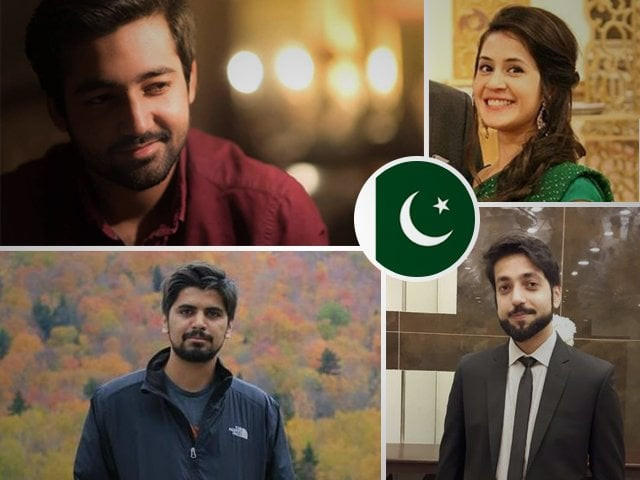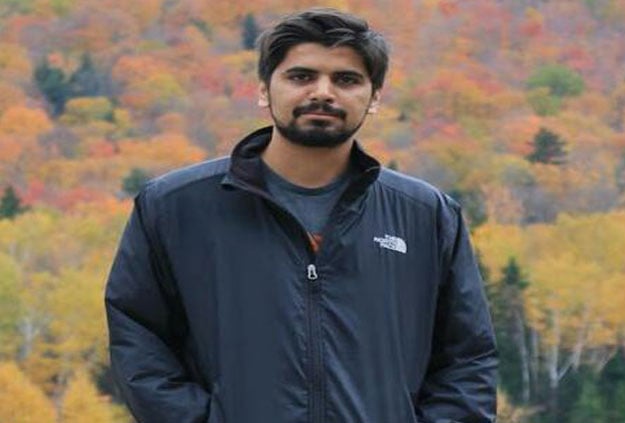The young and the restless — meet the Pakistani millennials
Much educated, urbanite millennials have distinct views on career choice, mate selection and patriotism

Much educated, urbanite millennials have distinct views on career choice, mate selection and patriotism. DESIGN: Nabeel Ahmed
So who actually are these millennials? There is a debate although over the time period that categorises each title, typically, a millennial refers to anyone born after 1983. The word millennial derives from the closeness of this generation to the new millennium and their coming-of-age in a digital world. They are also the children of the ‘baby boomers’ – born between 1943 and 1960 in a post-World-War-II and the post-Partition era that glorified the post-colonial nation state.
 Ayesha Nasir, Founder Buttercream Cupcakes. PHOTO: Shanel Khaliq
Ayesha Nasir, Founder Buttercream Cupcakes. PHOTO: Shanel KhaliqConsiderable research in the global north has closely looked at the differences between the two generations, especially with regards to their interaction in workplaces. But, Pakistani millennials are unique in terms of their socioeconomic and cultural context, which complicates this intergenerational conflict further.
Many of the Pakistani millennials are fighting battles, both at their homes and at their workplaces. Raised under conservative codes of religion and tradition, these millennials have their own set of defining experiences that are starkly different from those of their parents. Much educated, urbanite millennials have distinct views on career choice, mate selection and patriotism.
Research suggests that despite growing up in a world dominated by market capitalism, millennials tend to want beyond money from their jobs while rejecting traditional work values. According to a study conducted by Izzy Gesell, in 2010, for millennials, even a coffee shop with an access to Wi-Fi can serve as their workstations.
Pakistani duo showcases lighter side of country for fed-up millennials
Ayesha Nasir, founder of Buttercream Cupcakes – a Rawalpindi-based bakery for artisan cakes – operates from her mother’s kitchen. Back in 2011, while she was still a student completing her ACCA degree, Nasir made a big cake for one of her uncle’s 80th birthday bash.
“We just made a Facebook page after that, but everybody thought it wouldn't work out,” she says.
Slowly but surely, Buttercream Cupcakes has now become one of the biggest names in Rawalpindi. Nasir owns a team of four members. Her mother handles the baking, while she and her sister Zara Nasir design the fondant for customised cakes. Working nine to five as an accountant was never her thing and luckily, Nasir’s parents were on board when she wanted to start her own business. Her father owns a pharmacy and feels proud when he shows his daughters’ creations to customers.
 Ali Ahmed, CEO Maro Tandoors. PHOTO: Shanel Khaliq
Ali Ahmed, CEO Maro Tandoors. PHOTO: Shanel KhaliqOthers, however, were not so lucky from the beginning. Ali Ahmed, the CEO of the famed Maro Tandoors in Lahore, had to really harden himself up for the task.
Maro Tandoors was credited with a thought of reinventing the regular ‘naan’. It was a brainchild of a group of four Luminites, all of whom were majoring in separate disciplines two and a half years ago. Ahmed, who majored in Management Science, wanted to translate his love for food into a successful business venture. When he realised that no one with an educated background owned a Tandoor, he broke all the rules.
Initially, they tried their hands at selling 'naan' but, it did not work and soon they started having financial issues. Then was the time to experiment. “We didn't know much [about Tandoor] ourselves so we went to a Tandoor, knead the dough ourselves and baked the bread,” he says.
This hyperlocal social network for millennials aims to one-up on Facebook
The Maro Tandoors team brought in an assortment of things ranging from cheese to jelly mix to Nutella and decided to create something new with it. Their sales skyrocketed in the first few days and from there, they never looked back. The Luminites group is now actively involved in their business. They are pursuing their passion - be it handling the accounts, the marketing or the supply chain departments. Ahmed feels that most Pakistani universities do not train students to become entrepreneurs or businessmen. According to him, a larger context also does not encourage the trend and there is a tilt towards turning students into ‘corporate slaves’, as compared to creating something innovative and adventurous for themselves.
Ahmed’s parents were not aware of Maro Tandoors; instead, all they knew was that he was assisting a friend in his business. “One of my partners told his (friend’s) parents and they thought, he has lost his mind that he wants to open a Tandoor. I mean, after all, we were all studying at LUMS!” he recalls.
 Haaris Ghafoor. PHOTO: Shanel Khaliq
Haaris Ghafoor. PHOTO: Shanel KhaliqAt one point, Ahmed met Syed Babar Ali, a renowned business tycoon and the founder of LUMS, and told him about his idea only to be criticised that his idea would never work and he should go home and start a Tandoor there if it makes him happy. “This was when we all actually felt that we were doing something wrong,” Ahmed says.
When the very idea, became a big hit in Lahore, Syed Babar Ali invited the Maro Tandoors team to his office and acknowledged them for proving him wrong through hard work and commitment. “There’s obviously a generation gap but besides that, we don’t really have a culture of thinking out of the box. Everyone thinks that you're crazy if you're taking a risk. You're always being pushed to do a secured job that doesn't involve risk and makes sense to everyone,” Ahmed explains.
Successful business ventures inspired many to jump on the start-up bandwagon yet, running a business venture is not as easy as it seems so. Many, therefore, had to close down their businesses before they could reach their full potential.
Millennials have less sex: study
Haaris Ghafoor, 28, created a project that aimed to find successful small-scale businesses and multiply their impact through technology.
“Considering how much we like to talk about an ever increasing youth population, rarely anyone talks about the fact our economy is not ready to absorb that human capital. This alongside the fact that everything is very raw in Pakistan provides tonnes of opportunities to solving hard-core problems,” he clarifies.
Ghafoor, who is a software engineer by profession, is now based in Boston and works for a healthcare IT firm. After completing a Masters in electrical engineering from the Tufts University, he wanted to move back to Pakistan to start his own company. His parents at that point were not so sure.
“They [my parents] have both been, supportive and unsupportive, only because they were scared. My father had to work extremely hard, remain super-focused, and make sacrifices to get where he is today so it was hard for him to understand my unsettled nature,” he says.
However, Ghafoor continues, they have now understood his idea and are of the view that at some point in life, he should pursue his project again.
 Nawaz Aslam. PHOTO: Shanel Khaliq
Nawaz Aslam. PHOTO: Shanel KhaliqBrain drain – the movement of highly skilled and qualified people to a country where they can work in better conditions and earn more money – is another phenomenon that is now impacting Pakistan strongly than ever before. It is one of the major obstructions to the accumulation of human capital in the developing country. The prospects of earning a higher income features as the foremost attraction for most and so more and more educated millennials want to head westwards.
According to the 2002 US census, the average income of a US-based Pakistani household was $70,047, which was considerably higher than the average US household which stood at $57,852. This shows that on average, Pakistani families settled in the US are financially doing noticeably well.
But today, Pakistani millennials cogitate other possibilities too in their heads. Most of them value independence strongly. In addition, they have also come to realise the rewards of living in a multicultural and diverse society, where higher living standards and levels of development provide perfect options for them to pursue their passions.
Millennials want women to stay at home, says new study
Hassan Khan, a 25-year-old Vancouver-based Electrical engineer says he had to answer a million questions before he could convince his parents about his moving to Canada. He was convinced that the ‘ease to travel with a Canadian passport’ would be huge which motivated him to make the tough decision. Still, Khan also feels that if he could have the best of both the worlds, he would rather raise his family in Pakistan. His spurs are nonetheless a bit different than conventional wisdom.
“It is not so much the religious or cultural aspect. I just feel that growing up in Pakistan toughens you up which goes a long way towards your success. Children raised in Canada don’t really have to go through those experiences,” Hassan says.
Talha Beyg, 31, was born and raised in Islamabad but is currently living in Florenceville, Canada and works as an IT consultant. He tried his hands at living independently in Pakistan but the notion did not go as he was expecting.
After getting a job in his 20s, Beyg rented an apartment in the same city where his parents were living. He loved the fact that he did not have to answer anyone anymore but also realised that it was not easy. Once, Beyg had a chance of living in Sweden for a year and that time, he considered becoming one of the many overseas Pakistanis who harboured dreams of settling back in their country after working abroad for a few years.
“People there [Sweden] are far too removed from us. I did not realise that culture and religion have so much of a hold on me until I lived there,” he says.
5 things to consider before launching a start-up
Beyg also noted differences in the way people interacted abroad. “I have always been used to keeping in touch with my friends and family at all times but I ran into many antisocial people there [Sweden]. I would be the one making plans for the next weekend and not everyone responded the same way.”
The educated and skilled baby boomers of Pakistan, like other countries, have had life-long careers in civil bureaucracy, armed forces and other state institutes, seen as avenues that not only satiated one’s patriotic streak but were also means of social mobility, influence and stability.
Statistics from a recent US study insist that 35 per cent baby boomers believe that working an entire career in an organisation is preferable.
This is in stark contrast to millennials, who pose challenges to their employers internationally on accounts of retaining them. Why? Because they seek instant rewards for their hard work in the form of promotions, raises and recognition. Possibly this is why baby boomers see their children as ‘entitled’- they expect good things to come easily and quickly.
A glaring impact of this narrative can be witnessed in the public service sector. Once seen as the dream job for the crème de la crème of a society, the public service sector now is struggling to attract the top minds.
Research studies conducted in developed economies presents a parallel picture. As per a 2013 survey conducted in post-secondary institutions of Canada, a large majority of the student body wanted to opt for the private sector. This state, as an employer, has the reputation of being bureaucratic and riddled with red-tapism. Millennials, therefore, hold back from entering a setting that resists innovation. In developing countries, this problem is compounded by a lack of transparency and the prevalence of corrupt practices.
Another study conducted by Harvard University’s Institute of Politics in 2014 maintains that millennials place little trust in the government or state institutions. This is reflected not just in their preferences with regards to job selection but is also supported by statistics measuring voting behaviour.
Media revolution: Enter the new age
Nawaz Aslam, 28, received an undergraduate degree in mechanical engineering from the McGill University Canada, worked there for some time and then headed back to Pakistan after seven years. His father convinced him to sit in the CSS exams and join the civil service of Pakistan. But this was never his plan.
“The generation of our parents has always looked for financial security in life and a job in the bureaucracy provides that,” he says.
Job security and income stability are the two most major factors that apparently force anyone to pick public service as a career. It is a global trend. Lee and Choi’s 2013 study in South Korea analysed it and says that a vast majority of students chose this public service due to job security. A similar pattern was observed in Canada and Australia.
Now there are two things that Aslam wants to work on if he joins the public service sector: ending inefficiencies and conserving the environment. On the other hand, for a larger majority of Pakistani students, there are other motivations too.
“I know some people who want to join public service to take vengeance. They see something unfair happening to them or their family, like land grabbing, losing something because they didn't have a reference, and so they feel helpless in front of the system. That’s when they realise that at least this way they'll be able to protect their family,” Aslam notes.
He feels that over the years, the prestige associated with a career in public service has suffered, and millennials have become more cognisant of the political influence over the bureaucracy that renders it ineffective in bringing about a change.
When and how Pakistani millennials will reshape the world when it comes to their preferences, time will tell. However, what is definite is that their families, people around them and even organisations they work in have to adapt to their rules of engagement by becoming less cynical and more flexible and approachable.
Shanel Khaliq is a freelance journalist and a teacher who is interested in issues related to gender, race and social justice. She tweets @Shanel9999



















COMMENTS
Comments are moderated and generally will be posted if they are on-topic and not abusive.
For more information, please see our Comments FAQ